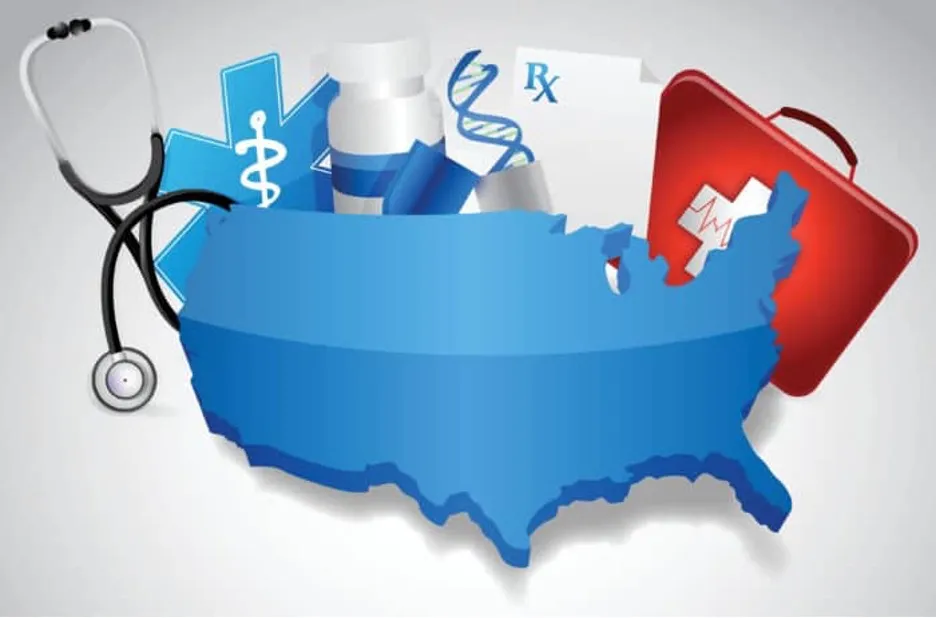
What is the ACA individual mandate and state individual mandates?
The ACA individual mandate (also known as the “individual shared responsibility provision”) requires most Americans to have qualifying health insurance (minimum essential coverage). The individual mandate is part of The Affordable Care Act (ACA) which became law in March 2010. If individuals didn’t have proof of health insurance when they filed their taxes, the IRS assessed penalties. In December 2017 (effective January 1, 2019), Congress repealed the financial penalties for individuals not having health insurance, but the requirement to have health insurance is still in place.
Since then, some states have turned to state individual mandates to keep their healthcare marketplaces stable. When healthy individuals are required to have health insurance, it helps spread the costs so those who have chronic conditions do not end up paying as much.
Which states have individual healthcare mandates?
To date, California, the District of Columbia, Massachusetts, New Jersey, Rhode Island, and Vermont have passed state individual mandates. With each state passing its own individual mandate, it makes it difficult for companies to keep up with all the different regulations and reporting requirements. Essentially, even if you have one employee filing taxes in one of these states, your company must comply with that state’s individual mandate. This means companies will not only have to be ACA compliant at the federal level, but also at the individual state levels. If your company needs help, please don’t hesitate to contact us.
It is expected that additional states may consider their own state healthcare mandate. Some of the states known to be considering it include Hawaii, Washington, Connecticut, Minnesota, and Maryland.
Below is some general information for each state that currently has an individual healthcare mandate.
California Individual Mandate
History of legislation
The State of California’s individual mandate, requiring residents to have qualifying coverage throughout the year, went into effect January 1, 2020. The individual mandate bill SB-78 was signed into law on July 2, 2019.
Important dates
Employers are required to file health coverage information annually by March 31st. The employee Form 1095-C mail deadline is January 31st, but there is no penalty assessed if the form prints by the federal deadline of March 2nd.
Employer obligations
In-state and out-of-state employers who employ California residents are obligated to provide the same data outlined in Section 6055 of the Affordable Care Act. This section specifically covers the enrolled coverage of employees while Section 6056 covers the offer of coverage to employees. Fully-insured employers rely on their insurer to provide data to the State and self-insured employers are required to submit their own data to the State.
The penalty for employers who fail to comply is $50 per individual not reported to the State. This means if an employer has only one employee in California, they would need to comply with the California individual mandate reporting for that employee.
California individual mandate penalties
Californians who do not have health insurance coverage and are not exempt will owe a penalty. See the latest on penalty costs.
Process for filing in California
An employer that offers health coverage through a self-insured health plan must report information about each individual enrolled in such coverage. This information must be reported on federal Form 1095-C, Part III, for any employee who is enrolled in coverage (and any spouse or dependent of that employee). Employers who offer health coverage through a fully-insured health plan can rely on their insurer to report information about each individual enrolled in such coverage. Employers with 250 or more information returns must file electronically through California’s FTB file exchange. More details can be found here.
District of Columbia Individual Mandate
History of legislation
The District of Columbia (D.C.) individual mandate, requiring residents to have qualifying coverage throughout the year, went into effect on January 1, 2019. The Individual Tax Payer Health Insurance Responsibility Requirement was signed into law on June 26, 2018.
Important dates
Employers are required to report annually, within 30 days after the IRS deadline for submitting 1095-B or 1095-C forms, including any extensions granted by the IRS. The employee Form 1095-C mail deadline is the same as the federal deadline, March 2nd. Employer obligations The legislation applies to in-state and out-of-state employers who withhold and pay payroll tax to D.C. or who employ D.C. residents, even if the employer does not withhold D.C. payroll taxes. The reporting obligation is limited to Applicable Large Employers (ALEs), but requirements differ based on whether the employer offers self-insured or fully-insured coverage.
In short, if an ALE is sending 1095-C forms to employees and filing 1095-C and 1094-C forms with the IRS, they are required to file forms with the state. Employers who only have fully-insured coverage cannot rely on the insurer to provide 1095-B forms alone, they will still need to submit 1095-C and 1094-C forms to D.C.
D.C. individual mandate penalties
D.C. residents who do not have health insurance coverage and are not exempt will owe a penalty.
Process for filing in D.C.
D.C. leverages their mytax.dc.gov portal using the Office of Tax and Revenue’s proscribed file format. The format is a delimited file with an extension of .txt. This differs from the IRS format, which is an XML file.
While D.C. indicates this is the same information provided to the IRS, for employers who employ non-D.C. residents, they must only include requested information in the file. Upon submission, a confirmation email will be provided. More details can be found here.
Frequently asked questions
Will D.C. provide feedback like the IRS, such as “accepted” “accepted with errors” or “rejected”?
MyTax.DC.gov does not generate an acknowledgment like IRS’s Affordable Care Act (ACA) Information Returns (AIR) System. Instead, applicable entities and third-party service providers will be notified if there are errors when they attempt to upload a file. If there are no errors, the bulk file upload will indicate “processing” until “accepted.”
If you replace or correct files with the IRS, should these files be shared with D.C.?
Yes. Applicable entities and third-party services providers can upload a correction file. However, only one correction file can be filed per business day. No files will be accepted after December 31 of the filing year.
Massachusetts Individual Mandate
History of legislation
The State of Massachusetts’ individual mandate, requiring residents to have qualifying coverage throughout the year, went into effect in 2006 and predates the Affordable Care Act.
Important dates
Employers are required to report annually. The reporting period is from Nov 1 to Nov 30. The state filing deadline is Dec. 15. The employee form mail deadline is Jan. 31.
Employer obligations
Unlike the state mandates enacted after the Affordable Care Act, the only employer reporting obligations relates to Form 1099-HC. Most insurance companies issue the forms on the employers’ behalf and send the state a reporting listing all the Form 1099-HC they issued.
Employers must file a Health Insurance Responsibility Disclosure (HIRD) form, which collects employer-level information about your employer-sponsored insurance (ESI) offerings. The HIRD reporting is administered by MassHealth and the Department of Revenue (DOR) through the MassTaxConnect web portal. The HIRD form will assist MassHealth in identifying its members with access to qualifying ESI who may be eligible for the MassHealth Premium Assistance Program.
Process for filing in Massachusetts
If your insurance company doesn’t file Form 1099-HC on your behalf, you are required to either upload the XML files through MassTaxConnect. More information about the requirements and how to file can be found here. If your company has less than 500 Form 1099-HCs to submit, you can do a mapped data upload.
New Jersey Individual Mandate
History of legislation
The State of New Jersey’s individual mandate, requiring residents to have qualifying coverage throughout the year, went into effect on January 1, 2019. It was signed into law on May 30, 2018. The state released reporting requirements in June 2019 and subsequent changes and updates to their requirements can be viewed on their website.
Important dates
Employers are required to report annually by the federal deadline, which is usually April 1st or the closest business day as advised by the IRS. The employee Form 1095-C mail deadline is usually on March 1st or the closest business day as advised by the IRS.
Employer obligations
In-state and out-of-state employers who employ New Jersey residents, even if the employer does not withhold New Jersey payroll taxes. The reporting obligation is limited to Applicable Large Employers (ALEs), but requirements differ based on whether the employer offers self-insured or fully-insured coverage.
Initially, NJ asked that if an ALE was sending 1095-C forms to employees and filing 1095-C and 1094-C forms with the IRS, they were required to file forms with the state. Employers who only have fully-insured coverage should verify that their insurer will fulfill the reporting requirements for the state. If an ALE’s insurer does not meet the obligation to file, the employer is required to file themselves. Likewise, all ALEs who participate in a multi-employer plan (whether self- or fully-insured) should verify reporting with their plan sponsor, or they will be required to file themselves. More details can be found here.
New Jersey individual mandate penalties
If a person fails to have health coverage or does not qualify for an exemption, they will be required to make a Shared Responsibility Payment. You can find more information about how to calculate an Estimated Shared Responsibility Payment here.
Process for filing in New Jersey
New Jersey leverages the same secure transport system that is used by employers or their vendor to submit W-2 forms. Called “MFT SecureTransport” or “AxWay,” vendors or ALEs must sign up with an account in order to be authorized to submit forms.
New Jersey requests the same XML file format used for submitting to the IRS. However, for employers who employ non-New Jersey residents, they must edit the file in order to remove those records. The XML file format requires full Social Security Numbers for employees and dependents, or dates of birth, along with full names and addresses. Further complicating matters is dependents can be covered on their parent’s insurance until age 26, they may be a resident of New Jersey while their parents are non-residents. The state advises employers notify employees in this situation to ensure their dependent receives a copy of the 1095-C instead.
Frequently asked questions
Will New Jersey provide feedback like the IRS, such as “accepted” “accepted with errors” or “rejected”?
New Jersey will only send an email notification confirmation of both successful transmission receipt and acknowledgment. If there are issues during processing, New Jersey will notify the vendor or employer. At this time, there are no other notifications being developed.
If you replace or correct files with the IRS, should these files be shared with New Jersey?
New Jersey indicated correction files should also be provided to New Jersey. Replacement files are accepted, but the only way a vendor or employer can track this is in the file name used on the transmission.
Rhode Island Individual Mandate
History of legislation
The State of Rhode Island’s individual mandate, requiring residents to have qualifying coverage throughout the year, went into effect on January 1, 2020. It was signed into law on July 5, 2019. Rhode Island issued proposed regulations outlining the employer reporting obligation and current requirements can be viewed on their website.
Important dates
Employers are required to report annually by the federal deadline, March 31st. The employee Form 1095-C mail deadline is also the same as the federal deadline, March 2nd.
Employer obligations
Employers must submit a report of covered individuals to the state, where a flat file version of the 1095-B is used (self-insured population).
Rhode Island individual mandate penalties
Rhode Island residents who do not have health insurance coverage and are not exempt will owe a penalty. See more about Process for filing A flat file format, (CSV), of the 1095-B is loaded directly into the Rhode Island site. A real-time confirmation is shown on the webpage once the file is successfully uploaded.
Process for filing in Rhode Island
A correction file can be sent any time after the original submission, in the same format, by uploading into the RI site. If the resubmission occurs after December 31st in the year in which it is due, Rhode Island requests that they be contacted by email at taxportal@tax.ri.gov with the subject line “Individual Mandate”. More details can be found here.
Vermont Individual Mandate
History of legislation
The State of Vermont individual mandate, requiring residents to have qualifying coverage throughout the year, went into effect on January 1, 2020. The law (H.696) was signed on May 28, 2018. Vermont has indicated that employer reporting is not required so long as the federal requirement to distribute 1095-C forms remains.
Important dates
Follows the same schedule as the IRS.
Employer obligations
None, so long as the federal requirement to distribute 1095-C forms remains.
Vermont individual mandate penalties
There are no cash penalties for non-compliance.
Need help with ACA or individual state mandate reporting? Benefitfocus helps our customers keep up with what’s new with ACA reporting and state individual mandates. Learn more about our end-to-end ACA compliance solution.
The information provided does not, and is not intended to, constitute legal advice; instead, all information and content herein is provided for general informational purposes only and may not constitute the most up-to-date legal or other information.


